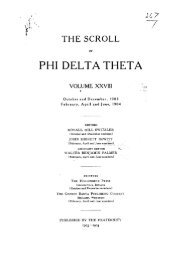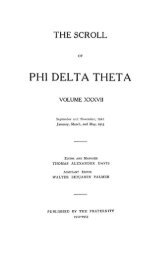1998 Volume 121 No 1–4 - Phi Delta Theta Scroll Archive
1998 Volume 121 No 1–4 - Phi Delta Theta Scroll Archive
1998 Volume 121 No 1–4 - Phi Delta Theta Scroll Archive
Create successful ePaper yourself
Turn your PDF publications into a flip-book with our unique Google optimized e-Paper software.
THE CARDINAL PRINCIPLES<br />
Friendship: More than words<br />
By Rev. David Turner,aS.B.<br />
Editor's note: One of the goals of General Council President Robert<br />
Deloian is to return to the Fraternity's founding principles. some years ago. Robert HodgeU did a marvelous piece tided<br />
and growing, I keep thinking about a woodcut I purchased<br />
With that in mind, we thought it appropriate to ask Fr. David "The Preacher." In the preacher's hand was his Bible. HodgeU<br />
Turner, Minnesota '70, a former General Council member and then had "WORDS" in a variety of typefaces, and these were<br />
chaplain of Benedictine University, to begin a series of columns coming from the preacher's mouth! There must have been 30<br />
on living our principles. Fr. Turner welcomes comments from or 40 of the single expression "words" in these various typefaces.<br />
The message was obvious: anything said can be regarded<br />
readers. Write him at Benedictine University, 5700 College Road,<br />
Lisle Illinois 60532-0900 or e-mail: dturner@hen.edu. as "just words."<br />
As I WORK WRITING THIS FEATURE ARTICLE, IT IS A<br />
quiet time on the Benedictine University campus.<br />
This is the week when student knowledge is<br />
measured through that nemesis of all academic<br />
life: final examinations. Students bounce in and<br />
out of my office, some seeking solace after what<br />
they believe was a "bad final,"while others desire<br />
to express their farewells. Some will go off to the<br />
world of work only to return on occasion to the<br />
campus as alumni. Others are promising to return<br />
next fall with renewed vigor for study and<br />
campus activity and interaction.<br />
My office seems to have an extra amount of<br />
activity since I was away for the week before finals<br />
began attending the Princeton Forum on Youth Ministry, a<br />
week-long program that brings together an interesting crosssection<br />
of people involved in ministry to youth and young<br />
adults. What attracted me most to the program was the presence<br />
of Dr. William H. Willimon, the dean of chapel at Duke<br />
University, as a main speaker.<br />
Dr. Willimon is a member of Pi Kappa Alpha, and an article<br />
that he wrote for his own fraternity's publication was sent to<br />
me when the editor of the <strong>Scroll</strong> firstapproached me about<br />
writing this feature. I made reference to the book Dr. Willimon<br />
wrote with Thomas H. Naylor in our last issue's feature. In ad-<br />
' dition to his two formal evening lectures at the conference. Dr.<br />
Willunon offered an afternoon workshop "From the Top of<br />
Mount Pisgah: Preparing Youth to Cross Over into College."<br />
The reference to the biblical Mount Pisgah recalls the scene in<br />
the book of Deuteronomy where God speaks to Moses and instructs<br />
him to "go up to the top of Pisgah, and lift up your eyes<br />
westward and northward and southward and eastward..." As<br />
Moses does this, he sees the promised land and is assured that<br />
Joshua will lead the people there.<br />
As I sat in Willimon's afternoon workshop and then later<br />
listened to his evening lectures, I continued to ask myself how<br />
we in <strong>Phi</strong> <strong>Delta</strong> <strong>Theta</strong> would lead our brothers into the promised<br />
land and bring to them that very important element of<br />
friendship, where it would be a true gift of friendship and<br />
something more than mere talk. Working as I do in an academic<br />
environment, I hear a lot of talk! As the talk keeps going<br />
Fr. Turner<br />
From the time I was a junior in college and<br />
took a course in the psychology of education, I<br />
have been interested in the ways in which we effect<br />
behavioral change, where the change is truly<br />
something more than talk! My 1970 doctoral dissertation<br />
at Minnesota focused on the topic of<br />
"group behavioral change." After one of the<br />
evening sessions, I approached Dr. Willimon with<br />
a copy of the <strong>Scroll</strong> in my hand. I wanted him to<br />
know that I had read The Abandoned Generation:<br />
Rethinking Higher Education, that I had referred<br />
to this work in an article, and that I was concerned<br />
about our Fraternity's values. I told him I<br />
was aware of his position that what was needed<br />
most in collegiate life today was friendship. He then told me<br />
that this was the focus of what he planned to talk about at<br />
Duke University's Baccalaureate Service.<br />
In Coretta Scott King's collection of her late husband's statements<br />
published as The Words of Martin Luther King, Jr., we<br />
have a sobering reminder: "One of the great problems of mankind<br />
is that we suffer from poverty of the spirit which stands in<br />
glaring contrast to our scientific and technical advance. The<br />
richer we have become materially the poorer we have become<br />
morally and spiritually." Dr. King's words find a real resonance<br />
in the topics we discussed in the Princeton Forum. What<br />
pleased me most was that there was no moaning about the music,<br />
the mores, and the manners of the current generation of<br />
collegians. The questions that did arise centered on ways in<br />
which we can support people as they seek to form firm friendships.<br />
Since we, in <strong>Phi</strong> <strong>Delta</strong> <strong>Theta</strong>, consider the ancient Greeks<br />
as holding out sound goals and values for our lives, perhaps we<br />
can keep in mind that the philosopher Aristotle noted that<br />
"Without friends no one would choose to live, though he or<br />
she had all the goods in the world."<br />
Here is part of what Dr. WOlimon told this year's graduating<br />
class at Duke: "Aristotle believed that higher education was a<br />
form of training in the virtues of friendship. He believed that<br />
there was no way to teach anything important to anyone who<br />
was not your friend—only friends know how to hurt you in<br />
the right way. True education is often painful. Time and place<br />
are important, because friendship takes time, frequent oppor-<br />
http://www.phidelt-ghq. com<br />
THE SCROLL SPRING <strong>1998</strong>

















